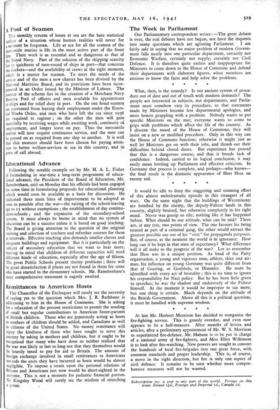It would be idle to deny the staggering and stunning
effect of this almost melodramatic episode in this strangest of all wars. On the same night that the buildings of Westminster are bombed by the enemy, the deputy-Fiihrer lands in this country, slightly bruised, but otherwise completely in his right mind. Never was gossip so rife; nothing like it has happened before. What should be our attitude, what can be said? There are, at any rate, two points of view. The one favours his being treated as part of a criminal gang, the other would extract the greatest possible use out of his "visit" for propaganda purposes. But, of course, at the moment the world is in ignorance. How long can it be kept in that state of expectancy? What difference will it all make to the progress of the war? Let us remember that Hess was in a unique position. As head of the Party organisation, a young and vigorous man, athlete, skier and air- man, his influence on young Germany was quite different from that of Goering, or Goebbels, or Hinunler. He must be identified with every act of brutality ; this is no time to ignore his responsibility for Nazi policy. But he has been little given to speeches; he was the shadow and understudy of the Fiihrer himself. At the moment it would be improper to say more, but one thing is certain. Much depends on the attitude of the British Government. Above all this is a political question; it must be handled with supreme wisdom.


























 Previous page
Previous page